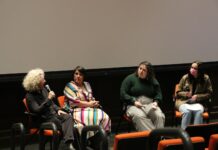Author:
The ensuing plot quickly disintegrates into hilarity as both Jonah and Marilyn go on dates that end up overlapping, allowing the lighthearted mood of the play to shine through. In the end, technical difficulties reveal that the two matches had been incorrect, and Jonah and Marilyn had genuinely been each other’s true equal all along.
The second evening, Feb. 25, began with junior Jake Mallove’s religiously charged “Mother Knows Best,” starring powerhouse guest Karen Kalensky as the conservative Jewish mother from a tight-knit Boston family. Mallove’s writing truly blossomed through the striking cast that, even with few rehearsals, kicked the energy into high gear.
The play opens with Michael Fontanesi (sophomore) bringing new fiancé Krista Weiss (senior) home to meet his parents, only to quickly ruin the mood by revealing that Weiss’ character Lily is not Jewish.
What follows is an alcohol-fueled hurricane of emotion and comedy, as Weiss and Kalensky proceed to form a tug-of-war for Fontanesi’s endorsement. While the play does examine rough coming-of-age issues, Mallove’s comic relief, sometimes provided solely by the insertion of Kalensky’s Yiddish, provides the respite for the palpable tension between the two women. Similarly, a well-cast guest actor John Apicella provided an interval for the play’s tension as did the brilliant Fontanesi.
After “Mother Knows Best” senior Jordan Puryear’s “The Will to Divide,” directed by Patrice Quinn, took the stage. Centered around the death of a family’s patriarch, the play explores strong themes of sibling rivalry in a well constructed blend of comedy and tragedy.
The play opens on a v-shaped arrangement of chairs, one for each of the four daughters of the dead patriarch with the mother, played by guest actress Veralyn Jones, at the tip of the “v.” While a minute detail, the resulting stage direction added an interesting spin on the play’s formula by verbally staging the performance.
At times of frustration, characters would leap and exclaim their stage direction (“Donna exits to the kitchen!”) while remaining in character, creating the air of drama that the staged reading could lack at times. The play exhibited well-committed, deep character development, as each daughter was given an elaborate back-story that, even after three rehearsals, still shined through in each performance.
The four daughters and mother exchanged lines of biting wit and raw emotion as Corey Libow (junior) read the will of the posthumous patriarch that bestowed ironic gifts to the living and revealed a deep rooted rivalry within the family. The production ended in the tragic death of the family’s mother, leaving the play open-ended as concerns about her own will punctuated the final line of the 45 minute production.
The following afternoon came senior Lauren Tannenbaum’s exploration of mother-daughter strife “House Fire.” The stand-out performances in “House Fire” of Janet Song (guest actress) and Margaret de Larios (senior) came from Tannenbaum’s convincing character development and great depth of dialogue, elements that ultimately bring the psychological breakdown of the family to life.
The play explores the dark past of Song’s mother character Alice, whose haunting past is revealed when a man comes to her family’s house saying that he had grown up there. The play continues with Alice’s struggles with de Larios’ Marie and with herself, a struggle that ultimately leads to the alluded-to fire that burns the house down.
Overall, the plays showcased strong student talent and exceptional casting of guest artists who together allowed the compelling writing of the five budding student playwrights to flourish on the stage.
This article has been archived, for more requests please contact us via the support system.
![]()






































